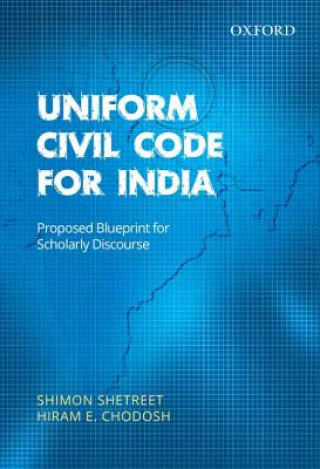
Kód: 02785015
Uniform Civil Code for India
Autor Shimon Shetreet, Hiram E. Chodosh
Article 44 of The Constitution of India, provides that 'The State shall endeavour to secure for the citizens a Uniform Civil Code throughout the territory of India.' Even after more than six decades, this anticipated code has not ... celý popis
- Jazyk:
 Angličtina
Angličtina - Vazba: Pevná
- Počet stran: 344
Nakladatelství: OXFORD UNIV PR, 2015
- Více informací o knize

1795 Kč
Dostupnost:
50 % šance Máme informaci, že by titul mohl být dostupný. Na základě vaší objednávky se ho pokusíme do 6 týdnů zajistit.
Máme informaci, že by titul mohl být dostupný. Na základě vaší objednávky se ho pokusíme do 6 týdnů zajistit.Prohledáme celý svět
Mohlo by se vám také líbit
Dárkový poukaz: Radost zaručena
- Darujte poukaz v libovolné hodnotě a my se postaráme o zbytek.
- Poukaz se vztahuje na celou naši nabídku.
- Elektronický poukaz vytisknete z e-mailu a můžete ihned darovat.
- Platnost poukazu je 12 měsíců od data vystavení.
Informovat o naskladnění knihy
Zadejte do formuláře e-mailovou adresu a jakmile knihu naskladníme, zašleme vám o tom zprávu. Pohlídáme vše za vás.
Více informací o knize Uniform Civil Code for India
Nákupem získáte 180 bodů
 Anotace knihy
Anotace knihy
Article 44 of The Constitution of India, provides that 'The State shall endeavour to secure for the citizens a Uniform Civil Code throughout the territory of India.' Even after more than six decades, this anticipated code has not been developed or implemented. This book provides a blueprint for alternative frameworks and courses of action, drawing on lessons from comparative context to develop a Uniform Civil Code for India. It explores the interplay between issues of law, culture, and religion in light of various intra-community and inter-community disputes. The book proposes a series of guidelines and considerations to inform this process. The first guideline urges that the process of preparing and implementing a Uniform Civil Code should be the function of the Legislature. The Courts can resolve certain specific points but the comprehensive code is a legislative function and not for judicial resolution. The second guideline suggests the parallel application of civil and religious law. The securing of a Uniform Civil Code must not negate the possibility of citizens availing themselves of religious law-if they so wish. The third guideline advises a gradual application of a Uniform Civil Code. The development of the code should be done topic by topic, chapter by chapter. The fourth guideline is to deploy tools of mediation in both the formation of the code and its implementation. This mediation should take on two forms - intercommunity mediation and individual mediation. The first of these two relates to a dialogue between the communities of India, to advance an agreement upon the substantive provisions of the Uniform Civil Code. The second relates to mediation between individuals, in occasions where dispute arises in the realm of personal law. The proposed blueprint derives guidance from the experience of other nations and the many ways in which they have faced the challenge of introducing a civil code and maintaining respect for local community laws and social customs. The blueprint also focuses on the relationships between religion and the state. This set of proposals should alleviate the suspicion of the Muslim community or the Hindu majority community. A Uniform Civil Code can be developed to achieve two simultaneous objectives: to maximize the sustainability of traditions and community values while also reinforcing constitutional values that prevent discrimination and, in particular, unfair practices to girls and women in a democratic country.
 Parametry knihy
Parametry knihy
Zařazení knihy Knihy v angličtině Law Jurisprudence & general issues Systems of law
1795 Kč
- Plný název: Uniform Civil Code for India
- Autor: Shimon Shetreet, Hiram E. Chodosh
- Jazyk:
 Angličtina
Angličtina - Vazba: Pevná
- Počet stran: 344
- EAN: 9780198077121
- ISBN: 0198077122
- ID: 02785015
- Nakladatelství: OXFORD UNIV PR
- Hmotnost: 526 g
- Rozměry: 226 × 142 × 22 mm
- Datum vydání: 30. July 2015
Oblíbené z jiného soudku
-

Islamic Finance
7167 Kč -

Islamic Government
719 Kč -

Roman Law and the Legal World of the Romans
3016 Kč -

Law of Obligations
4864 Kč -

Roman Law in European History
1092 Kč -

Introduction to Roman Law
1712 Kč -

Historical Introduction to the Study of Roman Law
2622 Kč -

Law Book
564 Kč -

Casebook on Roman Property Law
1834 Kč -

Spirit of Roman Law
1075 Kč -

Democracies Divided
1088 Kč -

Human Rights: Fact Or Fancy?
686 Kč -

Criminal Law of Ancient Rome
1008 Kč -

Is Killing People Right?
1033 Kč -

Islamic Finance
1202 Kč -

Law 101
798 Kč -

Civil Law Tradition
680 Kč -

Roman Law of Obligations
1794 Kč -

Common Law Legal English and Grammar
1512 Kč -

Laughing at the Gods
834 Kč -

Common Law in Two Voices
730 Kč -

Human Rights and Civil Liberties in the 21st Century
2998 Kč -

Al-Murshid Al-Mu'een
340 Kč -

Justice in Robes
908 Kč -

European Civil Code
1238 Kč -

Law and Life of Rome, 90 B.C.-A.D. 212
707 Kč -

Women, Crime and Punishment in Ancient Law and Society
3552 Kč -

Law and Morality
2040 Kč -

Digest of Roman Law
475 Kč -

Legal Norms and Normativity
3353 Kč -

Roman Law and the Legal World of the Romans
1145 Kč -

Roman Law and Common Law
1277 Kč -

Law and the Sacred
2193 Kč -

ABGB
10621 Kč -

From Human Dignity to Natural Law
1017 Kč -

Natural Law - Reflections On Theory & Practice
372 Kč -

Dictionary of Law
951 Kč -

Digest of Justinian: Volume 1
1671 Kč -

Manual of Roman Private Law
1825 Kč -

Codex Iuris Canonici
912 Kč -

Oxford Handbook of Islamic Law
5724 Kč -

Roman Law, Contemporary Law, European Law
4649 Kč -

Short Introduction to the Common Law
1020 Kč -

Islamic Jurisprudence in the Classical Era
1032 Kč -

Digest of Justinian, Volume 1
2114 Kč -

Comparative Law
7718 Kč -

Methods of Legal Reasoning
3289 Kč -

Shari'a
4518 Kč -

Reconciliation of the Fundamentals of Islamic Law
975 Kč
Osobní odběr Praha, Brno a 12903 dalších
Copyright ©2008-24 nejlevnejsi-knihy.cz Všechna práva vyhrazenaSoukromíCookies



 Vrácení do měsíce
Vrácení do měsíce 571 999 099 (8-15.30h)
571 999 099 (8-15.30h)